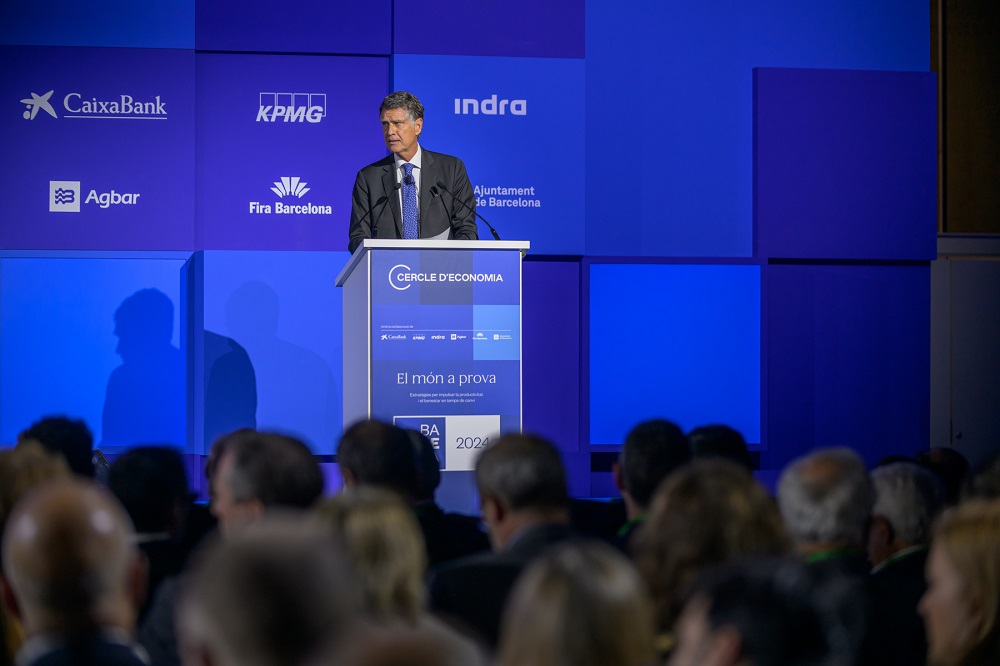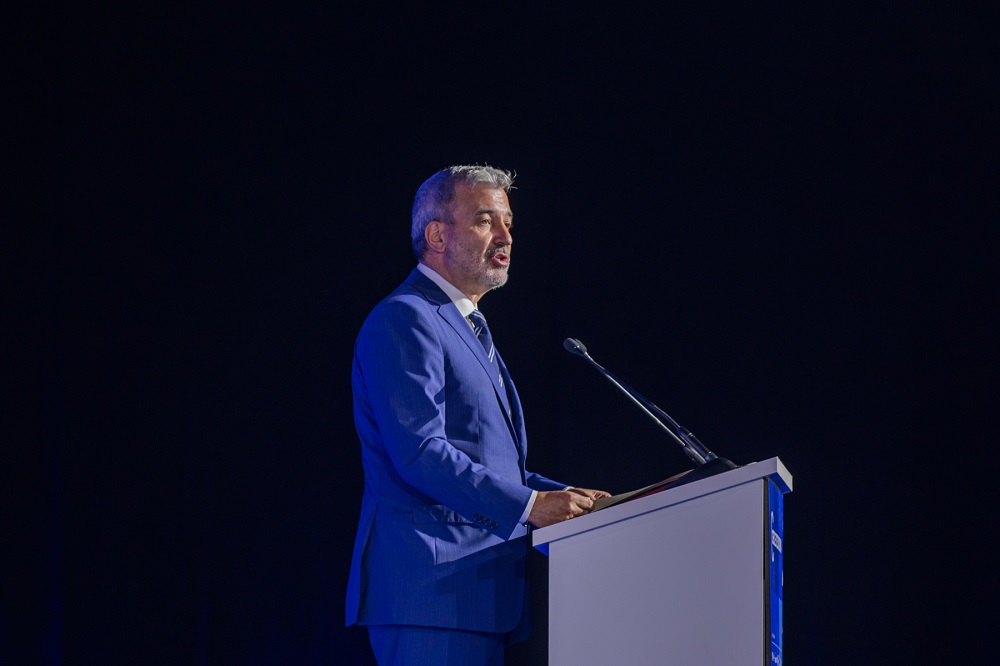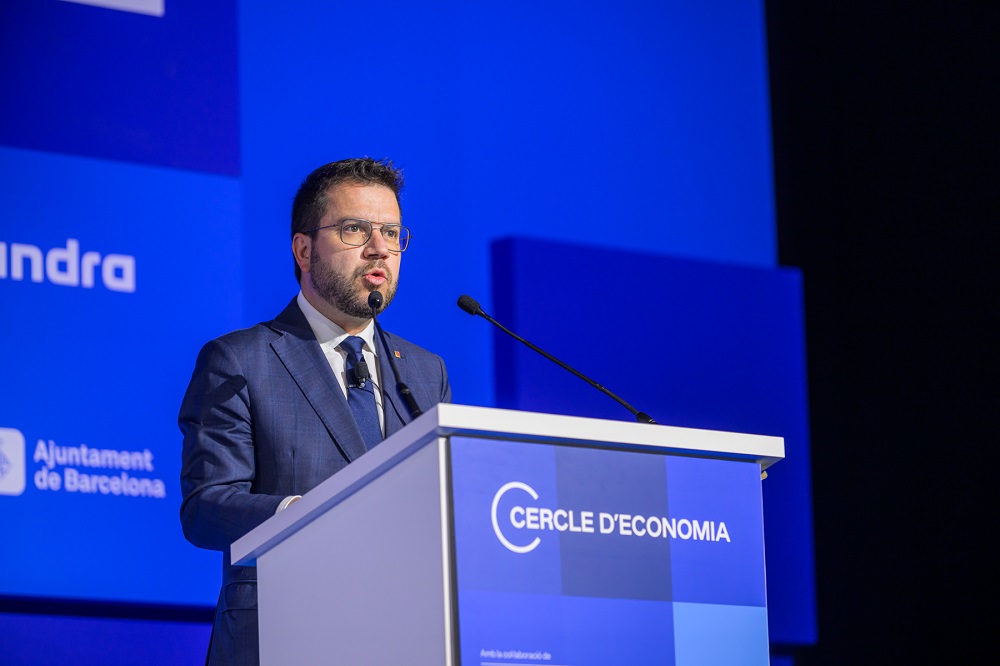After welcoming the President of the Government of Catalonia, Pere Aragonès, and the Mayor of Barcelona, Jaume Collboni, Jaume Guardiola, President of Cercle d'Economia, emphasised the importance of productivity, with the following argument: "It is key if we want to improve our level of well-being, if we want our companies to be able to pay higher wages and if we want to be able to better redistribute income and reduce poverty levels. It is also important if we want to have a rigorous debate about the possibility of reducing the working day." From this perspective, he regretted the low growth in productivity of the Catalan and Spanish economies, which he attributed to the fact that "they have based their evolution on labour-intensive but low-productivity sectors". He also warned of a "growing gap between northern and southern Europe, worrying from the point of view of the cohesion of the European project" and highlighted some of the main aspects of the debate in this new edition of the Cercle d'Economia Meeting (education, technology and artificial intelligence, administrative simplification, compatibility of sustainability with the improvement of industrial competitiveness, among many others) that, in his opinion, are useful when undertaking a multifactorial analysis of the present and future of productivity and "identifying possible solutions to the problem we have posed".
In the field of politics, the president of the Cercle d'Economia referred to the Catalan elections already held highlighting that "their result draws a profound change in the political map, but also a fragmented scenario", and predicted the importance of the European and US presidential elections scheduled for 2024.

The Mayor of Barcelona, Jaume Collboni, expressed his gratitude for the celebration of the Cercle d’Economia Meeting in the city since 2019 and praised this year's topics. In the context of the European Parliament elections, he stressed that these elections are "crucial" to defend the values of the European Union (EU): peace, cohesion, democracy and prosperity, especially in the face of the threat of far-right ideologies. He highlighted that European democracy is essential for productivity and well-being, "values that this Meeting vindicate". He also presented Barcelona as a model of prosperity and democracy - with "scientific and technological capitality" - and stressed its successes in terms of population growth, low unemployment and a record GDP of 100,000 million euros. "The current challenge is to transform this growth into a reduction in inequalities, with talent, technology and economic diversification," he said.
He called on Catalan political forces to reach agreements and avoid a political deadlock that "could harm vital projects such as the promotion of affordable housing, improvements in health care and the expansion of railway infrastructure." Collboni emphasised the need for courageous decision-making: "Barcelona is ready to compete and share its successes with the whole country." "These are times of decision, courage and leadership," he concluded.

The Catalan economy, "robust and well prepared"
For his part, the President of the Government of Catalonia, Pere Aragonès, thanked the Cercle d'Economia for the opportunity to share ideas on economic progress and spoke about the process of forming the new Parliament of Catalonia. He stressed that, despite the challenges (pandemic, high inflation, war in Ukraine and drought), the Catalan economy has proven to be "robust and well prepared", with structural soundness in terms of growth, prosperity and opportunities. Aragonès stressed that 2023 was a year of accelerated growth for the Catalan economy, with GDP increasing by 0.8% in the first quarter of 2024 and year-on-year growth of 2.6%, outpacing the rest of Spain and the Eurozone. He highlighted industrial growth and the creation of 370,000 new jobs, with the lowest unemployment rate in 16 years.
The president mentioned the importance of investments in reindustrialization and insisted on the need to improve productivity to sustain the welfare state in the face of demographic and cultural challenges, as well as "to direct investments well towards research, development and innovation." He closed his speech by highlighting the "solid industrial base" of Catalonia and its commitment to research and knowledge, but also to the challenges of European strategic autonomy.

Dialogue with Pere Aragonès
Jaume Guardiola regretted Pere Aragonès decision to step away from the political front line, both from a personal point of view and for the institution he represents. And he gave way to the president of the Generalitat, who addressed several issues. Aragonès analysed the ERC's poor results in the Catalan elections and opted to strengthen Catalonia's institutions, which "are the most valuable legacy of previous generations", while pledging to make a good transfer and a careful transition. He also expressed concern about the widespread growth of the far right, a phenomenon he attributes to the "loss of prestige of institutions." In productivity, he analyzed that this depends on factors such as sectoral and business composition - "influenced by historical conditions" - and other manageable factors.
In relation to the "disappointing results" of PISA in education, Aragonès attributed them to the "instability of educational management with five ministers in seven years and the resistance to change on the part of the unions". He argued that political decisions have long-term effects: "Past austerity policies have affected current educational outcomes, but recent increases in resources will begin to show improvements." In relation to the transfer of Rodalies, he stressed that it is a "complex issue" that requires "intense work" and that it must be accompanied by the necessary investments to improve a "very deficient" service.
Finally, regarding the agreement between ERC and the PSOE for the investiture of Pedro Sánchez, he noted that it includes the cancellation of the debt, the afore mentioned transfer of Rodalies and the promise to open a negotiation table to seek solutions to the financing problem. ERC, he insisted, "will continue to work to ensure that these agreements are fulfilled", while stressing the need for a significant change in the financing model to sustain the welfare state in Catalonia.